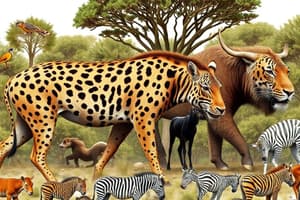Podcast
Questions and Answers
Human beings, as we know them, developed from earlier species of animals.
Human beings, as we know them, developed from earlier species of animals.
True (A)
In which country is evolution most accepted?
In which country is evolution most accepted?
- Denmark
- Iceland
- Latvia
- Sweden
- France (correct)
- USA
- Bulgaria
- Turkey
In which country is evolution least accepted?
In which country is evolution least accepted?
- Bulgaria
- USA
- Iceland
- Latvia (correct)
- Sweden
- Denmark
- France
- Turkey
Where does the United States fall in terms of acceptance of evolution?
Where does the United States fall in terms of acceptance of evolution?
When were domestic dogs clearly domesticated?
When were domestic dogs clearly domesticated?
The domestic tomato was bred by the Native Americans before the Europeans arrived in _______.
The domestic tomato was bred by the Native Americans before the Europeans arrived in _______.
Why aren't extreme forms evolved under artificial selection seen in nature?
Why aren't extreme forms evolved under artificial selection seen in nature?
All organisms use the same method of DNA replication.
All organisms use the same method of DNA replication.
Match the process with its description:
Match the process with its description:
What term describes the process when an ancestral population splits into two lineages that diverge and become different species?
What term describes the process when an ancestral population splits into two lineages that diverge and become different species?
Flashcards are hidden until you start studying
Study Notes
Descent with Modification
- "Nothing in biology makes sense except in the light of evolution." - Theodosius Dobzhansky
- Descent with modification is the concept that species change over time through small variations that accumulate and lead to new species.
Special Creation
- Each species was uniquely created for its niche.
- Species are unchanging, so they have no history.
- Species are parallel to each other, with no particular relationship.
- Species are perfect images in the mind of the Creator, but gather imperfections when put in physical form on Earth.
- Variation is imperfection.
Charles Darwin
- Amassed evidence supporting the observable pattern that species change over time, establishing it as a law (fact of evolution).
- Developed a mechanism to explain why species change over time and diverge, creating the wide diversity of life (theory of evolution - natural selection).
- Embarked on a five-year journey around the world on the HMS Beagle at age 22.
- Noted that species on islands are similar, but with differences that enable them to survive in their specific habitats.
Fossil Record
- Fossils of extinct species were found in different geological strata.
- The magnitude of difference between organisms increases as the distance between their strata increases.
- Transitional fossils exist between fish and amphibians.
- Fossil species are found that exhibit traits of two taxonomic groups.
Biogeography
- The study of the geographical distribution of species.
- Species don't live everywhere they can.
- Species on islands resemble species on the nearest mainland, even if the mainland has very different habitat.
- Species in an area resemble one another, even if the area has a wide variety of habitats.
Comparative Anatomy
- Homologous structures have the same underlying form but different functions.
- Vestigial structures resemble functional structures found in other groups, but are non-functional, smaller in size, and reduced in complexity.
Comparative Embryology
- The early stages of species tend to look similar, even though they look very different as adults.
- Homologous structures follow the same developmental path, even though they look quite different in the end.
Taxonomy and Systematics
- Descent with modification explains why species fall into groups based on shared similarities.
- Descent with modification explains why groups are hierarchical and inclusive.
Molecular Biology
- All organisms have the same DNA structure.
- Nearly all organisms use the same genetic code.
- All organisms use the same method of DNA replication.
- Eukaryotes partition their chromosomes before cytokinesis through the shared process of mitosis.
- All cells use similar sensing and signaling systems.
- There are many orthologous genes shared by a variety of widely different species.
Evidence of Descent with Modification
- Can be found in every area of biology: fossil record, biogeography, comparative anatomy, comparative embryology, taxonomy and systematics, and molecular biology.
Studying That Suits You
Use AI to generate personalized quizzes and flashcards to suit your learning preferences.




